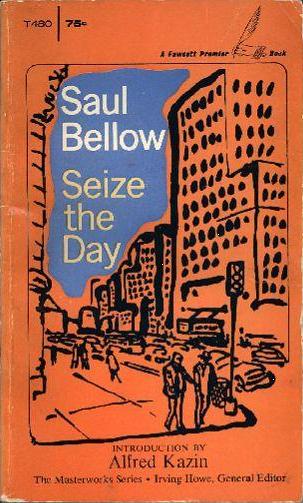 Every other man spoke a language entirely his own, which he had figured out by private thinking; he had his own ideas and peculiar ways. If you wanted to talk about a glass of water, you had to start back with God creating the heavens and earth; the apple; Abraham; Moses and Jesus; Rome; the Middle Ages; gunpowder; the Revolution; back to Newton; up to Einstein; then war and Lenin and Hitler. After reviewing this and getting it all straight again you could proceed to talk about a glass of water. "I'm fainting, please get me a little water." You were lucky even then to make yourself understood. And this happened over and over with everyone you met. You had to translate and translate, explain and explain, back and forth, and it was the punishment of hell itself not to understand or be understood, not to know the crazy from the sane, the wise from the fools, the young from the old or the sick from the well. The fathers were no fathers and the sons no son. You had to talk to yourself in daytime and reason with yourself at night. Who else was there to talk to in a city like New York?
Every other man spoke a language entirely his own, which he had figured out by private thinking; he had his own ideas and peculiar ways. If you wanted to talk about a glass of water, you had to start back with God creating the heavens and earth; the apple; Abraham; Moses and Jesus; Rome; the Middle Ages; gunpowder; the Revolution; back to Newton; up to Einstein; then war and Lenin and Hitler. After reviewing this and getting it all straight again you could proceed to talk about a glass of water. "I'm fainting, please get me a little water." You were lucky even then to make yourself understood. And this happened over and over with everyone you met. You had to translate and translate, explain and explain, back and forth, and it was the punishment of hell itself not to understand or be understood, not to know the crazy from the sane, the wise from the fools, the young from the old or the sick from the well. The fathers were no fathers and the sons no son. You had to talk to yourself in daytime and reason with yourself at night. Who else was there to talk to in a city like New York?There's something telling about the lengths of books. Beyond every other stylistic difference, there's something about, say, Muriel Spark's tendency to write short novels that differentiates her from someone like Tolstoy. Augie March is a Tolstoyesque book, immense, meandering, insatiably devouring different scenes and locales. What is the writer of Augie March trying to do in writing a book of only 100 pages, as in Seize the Day? What accounts for the difference?
For one, Augie March was a story of several years; Seize the Day, as its name suggests, is the story of a single day in the life of New Yorker Tommy Wilhelm. Tommy is a failed actor who has recently moved into the same building as his aging father, who is coldly dismissive of Tommy's many problems: his poverty, his strained relationship with his wife, who refuses to grant him a divorce. Spurned for money and compassion by his father, Tommy comes under the influence of the suspicious Dr. Tamkin, who convinces him to make an ill-advised investment in the commodities market.
Tamkin is full of cryptic, new-agey advice about how Tommy should reinvigorate his unhappy, broken life. But even the notion of success eludes Tommy:
But at the same time, since there were depths in Wilhelm not unsuspected by himself, he received a suggestion from some remote element in his thoughts that the business of life, the real business--to carry his peculiar burden, to feel shame and impotence, to taste these quelled tears--the only important business, the highest business was being done. Maybe the making of mistakes expressed the very purpose of his life and the essence of his being here. Maybe he was supposed to make them and suffer from them on this earth.
Perhaps, Tommy thinks, the "essence of his being here" is to suffer, but if that is so, why does his father fail to give him sympathy? His father, of course, is old and preoccupied with his own death, which he accuses Tommy--rightly--of not sufficiently caring about. Like his son, the father suffers acutely, but neither is able to work up the kind of regard for the other that would bring any kind of relief.
This particular day offers an intense crisis for Tommy, but nothing really happens to him over the course of it: the day is not seized; he exits the novel as feckless, confused, and frustrating as he enters it. One aspect of the novel's brevity is that it precludes any kind of change in Tommy or his father. It's difficult to imagine Tommy ever changing in any significant way, but over 300 pages that kind of stasis might have been maddening. Instead, Bellow offers us a glimpse at a man who is lost and will remain lost, and lets us briefly experience or recognize that mode of suffering.
Seize the Day is one of those novels where I feel as if something got past me--I feel, uncomfortably, as uncertain as Tommy at the novel's end. Is that by design, or is there really something in it that I'm missing? I cannot say I really enjoyed reading it, as I did Augie March or Henderson the Rain King. Tommy Wilhelm is a profoundly difficult protagonist, impossible to like and unpleasant to consider. Bellow's prose is, as always, something to behold, but it wasn't enough for me this time.

No comments:
Post a Comment